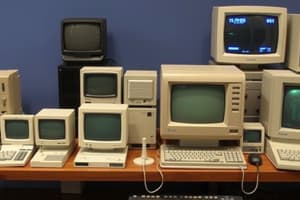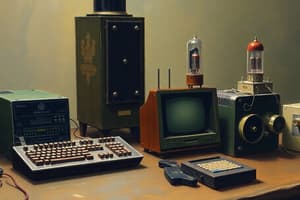Podcast
Questions and Answers
What was the earliest definition of the term 'computer'?
What was the earliest definition of the term 'computer'?
- A type of electronic device
- A mechanical device for performing calculations
- A person who carried out calculations (correct)
- A complex mathematical formula
Which device was invented first to aid in mathematical calculations?
Which device was invented first to aid in mathematical calculations?
- Pascaline
- Tally sticks (correct)
- Stepped Reckoner
- Abacus
Which of the following devices is specifically known for being able to perform addition and subtraction only?
Which of the following devices is specifically known for being able to perform addition and subtraction only?
- Jacquard Loom
- Pascaline (correct)
- Napier's Bones
- Abacus
What main operations could the Slide Rule, invented by William Oughtred, perform?
What main operations could the Slide Rule, invented by William Oughtred, perform?
What technological innovation in 1881 used punched cards for automation?
What technological innovation in 1881 used punched cards for automation?
What primary technology was used in the development of fourth generation computers?
What primary technology was used in the development of fourth generation computers?
Which of the following characteristics is NOT associated with the fifth generation computers?
Which of the following characteristics is NOT associated with the fifth generation computers?
During which period did the third generation computers primarily operate?
During which period did the third generation computers primarily operate?
What is a significant advantage of fourth generation computers over their predecessors?
What is a significant advantage of fourth generation computers over their predecessors?
Which of the following input and output devices is NOT typically associated with fifth generation computers?
Which of the following input and output devices is NOT typically associated with fifth generation computers?
What was the primary technology used in the first generation of computers?
What was the primary technology used in the first generation of computers?
Which of the following is NOT a characteristic of first generation computers?
Which of the following is NOT a characteristic of first generation computers?
During which years did the second generation of computers operate?
During which years did the second generation of computers operate?
What was the main advantage of second generation computers compared to first generation?
What was the main advantage of second generation computers compared to first generation?
Which device was primarily used for input and output in third generation computers?
Which device was primarily used for input and output in third generation computers?
What key component was introduced in third generation computers?
What key component was introduced in third generation computers?
Which statement about first generation computers is accurate?
Which statement about first generation computers is accurate?
Which of the following examples belongs to the second generation of computers?
Which of the following examples belongs to the second generation of computers?
Who invented the first mechanical calculator, known as the Arithmometer?
Who invented the first mechanical calculator, known as the Arithmometer?
Which of the following machines is recognized as the first mechanical computer?
Which of the following machines is recognized as the first mechanical computer?
What was significant about the Scheutzian Calculation Engine?
What was significant about the Scheutzian Calculation Engine?
Which computing machine was the first to utilize punch tape for programming?
Which computing machine was the first to utilize punch tape for programming?
What characteristic distinguished the ENIAC from earlier computers?
What characteristic distinguished the ENIAC from earlier computers?
Which computer was designed to have both program and data stored in memory?
Which computer was designed to have both program and data stored in memory?
Who is considered the first computer programmer for suggesting the binary system to Babbage?
Who is considered the first computer programmer for suggesting the binary system to Babbage?
What was the UNIVAC 1 known for in computing history?
What was the UNIVAC 1 known for in computing history?
Flashcards are hidden until you start studying
Study Notes
Inventions and Innovations in Computing
- Arithmometer: Mechanical calculator by Thomas de Colmar (1820), first reliable device for basic math operations, and mass-produced.
- Difference Engine: Created by Charles Babbage (1822), first mechanical computer designed to tabulate polynomial functions automatically.
- First Computer Programmer: Augusta Ada Byron promoted the binary system to Babbage in 1840 and wrote programs for his Analytical Engine.
- Scheutzian Calculation Engine: Developed by Per Georg Scheutz (1843), the first printing calculator based on Babbage's Difference Engine.
- Tabulating Calculator: Invented by Herman Hollerith (1890) for data summarization and accounting tasks.
- Harvard Mark 1: Also called IBM ASCC, created by Howard H. Aiken (1943), recognized as the first electro-mechanical computer.
- Z1: Konrad Zuse's creation (1936-1938), regarded as the first programmable computer utilizing punch tape for input/output.
- Atanasoff-Berry Computer (ABC): First electronic digital computing device, co-developed by John Atanasoff and Clifford Berry (1939-1942).
- ENIAC: First electronic general-purpose computer, developed by John Presper Eckert and John Mauchly, completed in 1946.
- UNIVAC 1: First commercial computer designed by Eckert and Mauchly.
- EDVAC: First stored program computer designed by Von Neumann (1952), capable of holding programs and data in memory.
- OSBORNE 1: First portable computer released in 1981.
Historical Context of Computers
- Early Computers: Humans termed "computers" performed calculations, which were specialized and required extensive training.
- Tally Sticks: Ancient devices used for recording numbers and quantities.
- Abacus: Mechanical device from Babylonia (2400 B.C.), later familiar in China (500 B.C.), utilized for basic arithmetic.
- Napier’s Bones: Created by John Napier (1614), allowed calculations like multiplication and square roots using rods.
- Slide Rule: Invented by William Oughtred (1622), primarily for multiplication, division, and logarithmic calculations.
- Pascaline: Blaise Pascal's invention (1642) that could only perform addition and subtraction.
- Stepped Reckoner: Created by Gottfried Wilhelm Leibniz (1672), capable of automating addition, subtraction, multiplication, and division.
- Jacquard Loom: Mechanical loom by Joseph-Marie Jacquard (1881), the first to use punched cards for automation.
Generations of Computers
- First Generation (1946-1958): Utilized vacuum tubes leading to high costs, heat generation, and large size. Supported batch processing and machine code.
- Second Generation (1959-1964): Introduced transistors, smaller size, less electricity, and heat. Used magnetic core memory for faster processing.
- Third Generation (1965-1970): Featured integrated circuits (IC), higher performance, and lower maintenance costs, widely used in business and research.
- Fourth Generation (1971-2010): Microprocessor technology enabled portable and affordable computers with faster computation and greater accessibility.
- Fifth Generation (2010-today): Based on AI, quantum computing, and parallel processing, characterized by speed, multitasking, and low power consumption.
Future of Computers
- Positive outcomes may include advanced AI capabilities, improved efficiency in various sectors, and broader accessibility of technology.
- Negative implications could involve ethical concerns in AI usage, job displacement due to automation, and increased reliance on technology impacting personal skills.
Studying That Suits You
Use AI to generate personalized quizzes and flashcards to suit your learning preferences.




